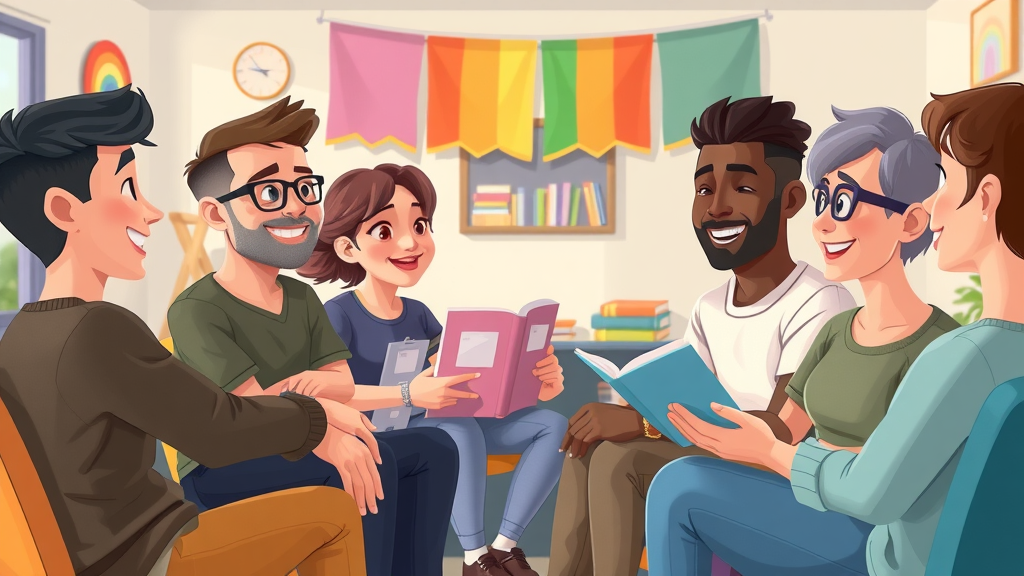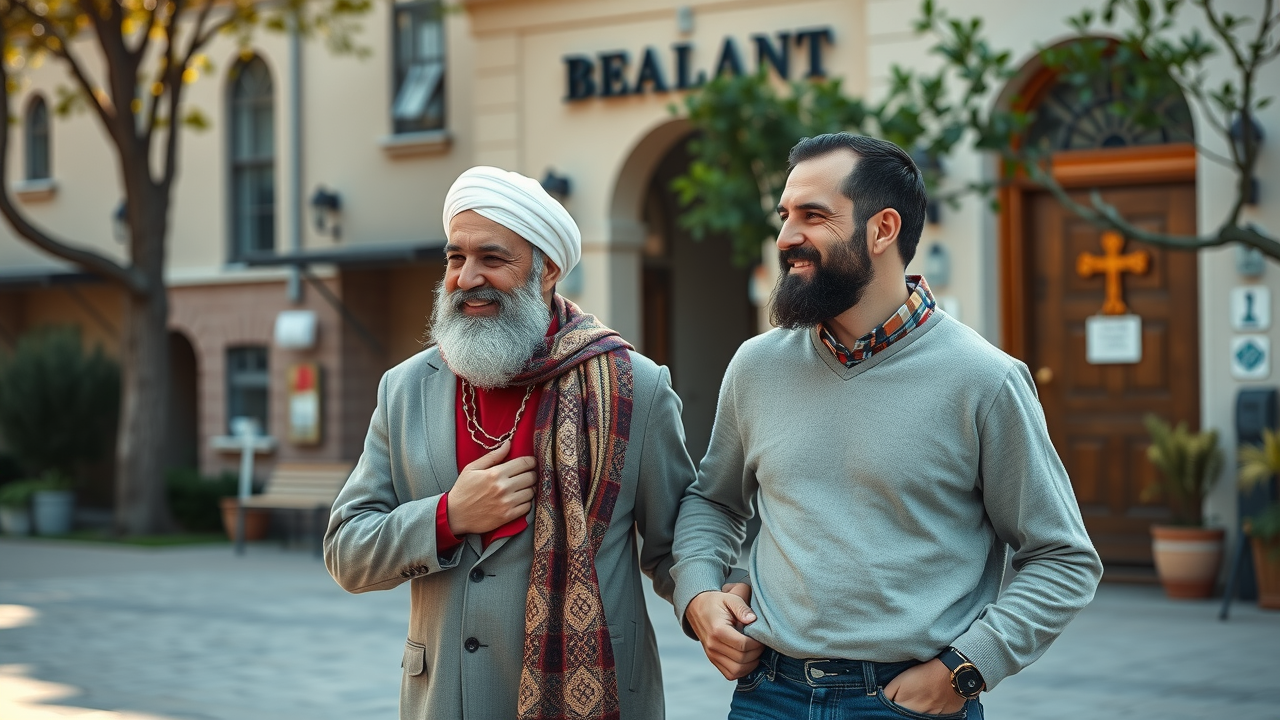Introduction: LGBTQ+ Interfaith Couples Meeting Unique Challenges
Love can unite, yet sometimes the world attempts to divide. For many LGBTQ+ interfaith couples, building a life together means standing courageously at the intersection of faith and identity, carving out space for connection — even as family, community, and history present challenges at every turn. From the bustling streets of San Francisco to smaller towns across the UK, couples and families who defy convention face extra questions, misunderstandings, and sometimes even direct opposition. But those who persevere often find a deeper bond and unique strengths they never could have imagined.

"Two people, deeply in love, stood before their families – each holding beliefs that signified tradition, hope, and identity. Their journey as an LGBTQ+ interfaith couple demanded courage, resilience, and partnership unlike any other."
What You'll Learn as an LGBTQ+ Interfaith Couple
Ways LGBTQ+ interfaith couples manage religious, cultural, and societal pressure
Effective communication and conflict management strategies
The therapeutic options available for LGBTQ+ interfaith couples
Alternatives to therapy when traditional counselling may not be accessible or suitable
Answers to frequently asked questions surrounding interfaith and LGBTQ+ relationships
Understanding LGBTQ+ Interfaith Couples: Definitions and Contemporary Realities
“Interfaith couple” describes partners who each come from a different religious or faith background. In the context of LGBTQ+ interfaith couples, an added layer arises: sexual orientation and gender identity intersect with religious traditions, often complicating relationships in unexpected ways. For bisexual and transgender individuals, these intersections can bring both vibrant cultural backgrounds and potential sources of strain. Societal perceptions of interfaith couples have evolved, yet barriers remain: while some Jewish communities and reform movements may welcome interfaith marriage, others maintain more rigid stances, especially regarding same-sex partnerships or non-binary identities. Recent studies from social work and humanistic Judaism illustrate that more couples and families than ever are negotiating these realities: many have children, juggle extended family members’ expectations and face a steep learning curve.
Couples and families navigating interfaith relationships may encounter robust debate around religious practices or even the celebration of pivotal moments — such as bat mitzvah ceremonies or recognising holidays from multiple traditions. Among LGBTQ+ individuals, the sense of being “caught between worlds” is not uncommon — sometimes feeling like an outsider in both faith and LGBTQ+ spaces. However, where acceptance and dialogue are present, these couples and families can experience extraordinary personal growth and mutual understanding. Importantly, each interfaith relationship is shaped by context: race, language, ethnicity, years old (age differences across generations), and local customs may all play a significant part.

What constitutes an interfaith couple and relationship
How sexual identity and faith traditions affect bisexual and transgender partners
Key demographics among interfaith couples and families
Societal perceptions of interfaith relationships in LGBTQ+ experiences
Challenges Faced by LGBTQ+ Interfaith Couples and Families
The road for LGBTQ+ interfaith couples is rarely smooth. Sometimes the difficulty arises within religious communities or when family members are uncomfortable with one or both identities. Other times, LGBTQ+ and bisexual and transgender individuals face barriers even from within progressive spaces, feeling hesitant to fully participate in rituals or conversations where faith is central. The intersectional stigma, particularly around d b (disagreement and boundaries), can complicate how couples relate to one another and their wider support systems.
Societal myths surrounding both interfaith couples and LGBTQ+ relationships persist: assumptions that such partnerships are inherently volatile or unsustainable lead to unnecessary scrutiny and stress. Complications may occur around marriage, rituals like bat mitzvah or mitzvah service, and the challenge of gaining acceptance at events governed by strong religious traditions. Legal obstacles vary depending on location – for example, areas in the Bay Area or the UK offer some protections, while couples and families in other regions may face compounded barriers related to both faith and sexuality. Even though the reform movement has championed inclusion, many lgbt individuals report that acceptance in religious settings can be fleeting.
Challenge |
Faith-Based Couples |
LGBTQ+ Only Couples |
LGBTQ+ Interfaith Couples |
|---|---|---|---|
Acceptance in Religious Settings |
Sometimes |
Often |
Rarely |
Family Support |
Often |
Varies |
Mixed |
Legal Barriers |
Varies |
Yes, in some regions |
Yes, compounded |
Identity Expression |
Yes |
Yes |
Yes, heightened |
Navigating religious expectations, community response, and acceptance
Pressure from both faith-based and LGBTQ+ spaces
Intersectional stigma (d b)
Common societal myths about interfaith couples
Complications relating to marriage, rituals, and family support
Healthy Communication and Coping for LGBTQ+ Interfaith Relationships
Building a successful interfaith relationship for LGBTQ+ couples and families means more than simply addressing disagreement and boundaries (d b). It is about consistently affirming the identities, faiths, and traditions of each partner, while respecting differences in practice. Couples who thrive are those that openly discuss expectations, set clear boundaries with their families, and co-create shared values without erasing each other's background. These strategies are not only vital within the couple, but also when approaching extended family or wider communities where misunderstanding or confrontation may be common.
Effective communication revolves around honest dialogue and active listening — creating space for the lived experiences and stories that define each partner’s sense of self. Respecting privacy and recognising social justice issues connected to faith or sexuality can help in resolving conflict without alienation. Many couples and families find that constructing a unique set of traditions, or adapting rituals such as bat mitzvah, helps everyone feel included. For bisexual and transgender partners, connecting with identity-affirming spaces and community support becomes especially valuable in managing stress and sustaining wellbeing. Ultimately, addressing d b and providing frequent affirmations directly supports the longevity of the relationship.

Building shared values in interfaith relationships
Respecting religious and LGBTQ+ identities in couples and families
Resolving d b (disagreement and boundaries) effectively
Approaches to family engagement and negotiation
List: Action Steps for Couples Facing Interfaith and LGBTQ+ Challenges
Set clear boundaries with extended family
Prioritise respectful dialogue between partners
Seek resources such as bisexual and transgender community support
Use non-violent communication methods
Consider co-creating traditions meaningful to both
For couples seeking practical guidance on strengthening their partnership and navigating everyday relationship hurdles, exploring relationship counselling options in Brighton can offer tailored support and proven strategies for communication and connection.
Therapeutic Support for LGBTQ+ Interfaith Couples: Benefits and Considerations
Therapy can be transformative for LGBTQ+ interfaith couples, offering a secure space free from judgement where couples and families can fully participate, process disagreements, and explore shared goals. Working with a culturally competent, LGBTQ+-affirming therapist who understands the complexities of interfaith relationships is key. Couples therapy helps partners develop mutual understanding about boundaries and communication, directly addressing issues around religious practices and sexual or gender identity. For individuals—especially bisexual and transgender people who may feel isolated—individual therapy provides personal affirmation, support our LGBT individuals, and tools for coping with intersecting challenges.
Mental health professionals with experience in humanistic Judaism, faith-diverse backgrounds, or social work related to lgbt individuals offer nuanced care that honours identity, privacy policy, and cultural backgrounds. Effective therapy will actively engage with the ways in which disagreement and boundaries (d b) show up in rituals, child-rearing decisions, and family member interactions. Some therapists, particularly in the Bay Area or other LGBTQ+-inclusive regions, tailor counselling for non-binary or transgender clients, amplifying personal strength and resilience. Therapy is not a “one size fits all” solution, but a collaborative process respectful of both partners’ needs.
"Therapy offers a safe space for LGBTQ+ interfaith couples to express their faith, gender identity, and relationship needs without fear of judgement or misunderstanding."
How couples therapy addresses unique needs of LGBTQ+ interfaith couples
The interplay of sexual and religious identities in counselling
Individual therapy for partners feeling isolated
Approaches used in therapy for bisexual and transgender clients
Culturally competent and LGBTQ+-affirming therapists
Alternatives When Therapy May Not Suit LGBTQ+ Interfaith Couples
In cases where therapy is unavailable or not the right fit, other sources of support are vital. Peer networks comprising other interfaith couples and families, particularly those who are also bisexual and transgender, provide mutual understanding and real-world strategies. Online forums and confidential communities allow for anonymous sharing of challenges and successes, valuable for those who may feel like they must hide or who have experienced family rejection. Faith-specific LGBTQ+ groups empower members to participate fully in their traditions, sometimes finding ways to make traditional religious practices—such as bat mitzvah—truly inclusive.
Individual spiritual mentors, supportive family members, or even celebrants familiar with interfaith relationship contexts can create safety and celebration for couples and families. Peer support is often especially meaningful in moments of disagreement and boundaries (d b), helping couples see that they are not alone in the learning curve. Resource lists curated by community leaders, LGBT individuals in social work, or organisations supporting social justice in faith contexts are invaluable — especially where mainstream therapy may not reflect the lived experience of LGBTQ+ interfaith couples.

Supportive interfaith relationship networks
Online communities and confidential forums
Faith-specific LGBTQ+ groups
Peer support for bisexual and transgender partners
Individual spiritual mentors, allies, or celebrants
Cultural and Societal Considerations Impacting LGBTQ+ Interfaith Couples
Culture, law, and local customs have a profound influence on the wellbeing of LGBTQ+ interfaith couples and families. Legal status of interfaith marriages varies greatly worldwide: while some countries and regions like San Francisco or the Bay Area adopt inclusive policies, other places have laws or traditions that actively undermine couples’ rights. Acceptance by faith groups is similarly inconsistent. The Jewish community, for example, reflects a wide range of perspectives—from reform movement inclusion to Orthodox hesitance around both interfaith and same-sex couples. Differences in religious practices and rituals, such as who can participate in a bat mitzvah, may present particular challenges for families wanting to celebrate both faiths.
Intersectional identities make the experience all the more complex. Race, ethnicity, and language affect how individuals and couples feel like they belong in their communities. Children raised by LGBTQ+ interfaith couples may enjoy the benefit of both rich cultural backgrounds, but may also require attentive support and guidance in understanding their identities. Some couples seek guidance from professionals in social work or turn to peer networks for practical solutions, affirmation, and a chance to interact with others who understand the balance needed to fully participate in both their faith and LGBTQ+ community lives.

Local customs and context for interfaith marriage (e.g. legal, cultural)
Faith group differences in accepting interfaith couples
Intersectional experience: race, ethnicity, language, and location
Children in interfaith couples and families
People Also Ask: LGBTQ+ Interfaith Couples
What are interfaith couples?
Answer: Interfaith couples are partnerships in which each partner comes from a different religious or faith background. For LGBTQ+ interfaith couples, elements of gender identity and sexual orientation add complex dimensions to these relationships.
Do Jews allow interfaith marriage?
Answer: Attitudes toward interfaith marriage vary within the Jewish community. While some denominations (such as Reform Judaism) show acceptance, Orthodox and Conservative communities may maintain more restrictive views. For LGBTQ+ interfaith couples, these attitudes can intersect with views on same-sex or non-binary relationships.
Is interfaith marriage okay?
Answer: Acceptance of interfaith marriages depends on personal, familial, and community beliefs. Many couples find meaning and respect in bridging their faiths, while others may face opposition. Open communication and support networks help LGBTQ+ interfaith couples navigate these complexities.
What is a risk that interfaith marriage couples experience?
Answer: Common risks for interfaith couples include familial or community rejection, internal conflict over religious or cultural values, and a lack of acceptance from either faith community. LGBTQ+ interfaith couples often find these risks heightened due to additional bias or exclusion.
FAQs for LGBTQ+ Interfaith Couples
How do interfaith couples celebrate religious holidays?
Many couples and families create new blended traditions or alternate holiday celebrations, honouring both faith backgrounds and making sure everyone feels included, regardless of gender identity or orientation.Where can bisexual and transgender partners find support?
National and local LGBTQ+ organisations, faith-affirming groups, online forums, and culturally specific communities offer guidance for bisexual and transgender individuals in interfaith relationships.What if my family's faith does not accept my partner?
Setting boundaries with family members and seeking support from peers, therapists or mentors can help maintain connection while protecting your relationship’s integrity and wellbeing.What resources exist for interfaith couples and families?
Interfaith support groups, affirming therapists, online resource libraries, and community social work programmes for lgbt individuals are available to help navigate relationship challenges.How can children be raised with respect for both faiths and identities?
Inclusive communication, shared education about each faith tradition, and ongoing affirmation of all identities ensure that children of LGBTQ+ interfaith couples can participate fully in family and community life.
Key Takeaways for LGBTQ+ Interfaith Relationships
LGBTQ+ interfaith couples and families face unique and often heightened challenges, but resilience is possible
Communication and respect are fundamental for thriving
Multi-layered support – professional, community, and peer-led – improves wellbeing
Intersectional identities deserve affirmation, validation, and robust support
Watch:
Conclusion: LGBTQ+ Interfaith Couples Can Flourish
"At the intersection where faith meets love and authenticity, LGBTQ+ interfaith couples continue to show that connection – when supported – can triumph over adversity."
Reach Out: Dedicated Support for LGBTQ+ Interfaith Couples
Visit us at: https://thehovecounsellingpractice.co.uk/contact/
Email us: info@thehovecounsellingpractice.co.uk
Call: 07947 073298
If you’re interested in exploring the wider landscape of relationship dynamics and want to deepen your understanding of how couples can overcome a variety of challenges, the relationships resource hub offers a wealth of articles and expert advice. Whether you’re seeking new perspectives on communication, guidance for navigating life transitions, or inspiration for building lasting intimacy, these resources can help you take the next step in your journey. Embracing ongoing learning and support is key to thriving together, no matter your background or circumstances. Discover more ways to nurture your relationship and empower your unique partnership today.
 Add Row
Add Row  Add
Add 



Write A Comment